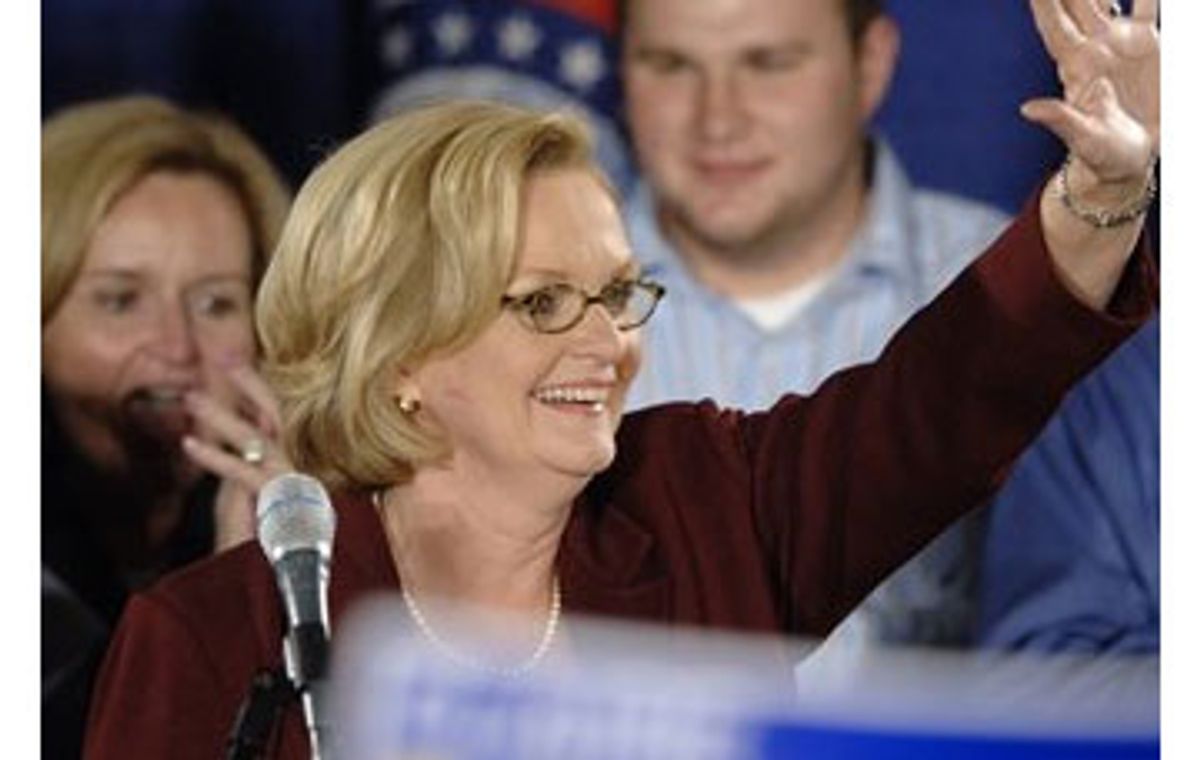Before the roar that went up when CNN showed her taking the lead over Republican incumbent James Talent around midnight, before the "We Want Claire" chants from the crowd of gathering supporters, before she finally took the stage in front of a frenzied crowd, Claire McCaskill had to be talked into running for the U.S. Senate.
Sen. Chuck Schumer tracked down McCaskill, then the Missouri state auditor, on vacation in Europe during the summer of 2005. He tried to sell her on the race, promising money and support from the Democratic Senate Campaign Committee. She took in everything he said and did nothing. She wanted Labor Day weekend to think about it.
One heavy Democratic donor advised her not to run. Just wait, he told her -- one bad poll and they'll cut you loose, just like they did John Kerry.
Democrats are haunted by 2004. But the presidential race was only part of a long string of losses here. Two years ago, McCaskill ran for governor against then Secretary of State Matt Blunt in the race of her life. Things didn't go as planned. She underperformed in the debates; the national psyche stayed with the Republican administration despite a torrent of bad news; and when presidential nominee John Kerry started to lose ground in Missouri, the national party pulled out its ground forces and television ads.
Not only did McCaskill lose that year, Missouri Democrats also lost seats in the state House and Senate, as they had consistently over the past two decades. The last time they picked up state legislative seats over a cycle was 1986. They'd gone from holding the governor's mansion, the House and the Senate to holding nothing.
If the Democrats had 2004 on the brain this campaign season, they weren't alone. Republicans in Missouri used their wins from that year as a template for their campaign. Blunt had beaten McCaskill by running negative advertisements about her husband's business dealings, particularly his nursing home operations.
This year, Talent's negative ads hammered away at the same themes while ignoring Iraq, gas prices and Medicaid cuts that had dominated local headlines. It seemed a smart, if heavy, bet. These personal attacks had worked just two years ago. They would likely work again.
Maybe that's why Democrats here on the second-floor ballroom of the Renaissance Hotel in downtown St. Louis had a certain dread all night. They wouldn't let themselves believe that McCaskill might win.
Same went for those upstairs in the suite reserved for the city's Democratic Central Committee. Populated with a who's who of the St. Louis politico-ritzy, it had been the party to party at two years prior. Then Brian Wahby, chairman of the committee, had exuberantly declared Kerry the new president in the afternoon. This time the mood was tamer, and Wahby was soft-spoken. He allowed himself to be, he said, "cautiously optimistic and nervous."
As good news began to trickle in throughout the night, McCaskill supporters fought it off with disbelief. Heavy turnout, thought to favor Democrats, was suspect. It might be the conservatives and evangelicals reacting to Amendment 2, the ballot initiative to protect stem cell research. The early exit polls that made the rounds on the floor -- one reading 50-48, the other 53-46, favoring McCaskill -- were flawed samples like the ones they remembered from two years ago that showed Kerry leading.
Liz Smith, a spokeswoman for the McCaskill campaign, made a tight smile as rural results showed narrow margins. "This hasn't been called yet," she said. A close race in Virginia -- at the time favoring Republican George Allen -- gave everyone pause. But in St. Louis, the cautious and the nervous were starting to relax. Meanwhile, a Republican called from Talent's headquarters to say it was obvious to them that the race was over: McCaskill had won.
Thirty minutes later, McCaskill was onstage giving the crowd the speech they'd waited for. The loudest applause line probably wasn't written as one: "Missourians have rejected the politics of personal attacks," a reference to the Talent attack ads that had swarmed the television for weeks.
That's the lesson that state Sen.-elect Jeff Smith took away from election night here. "It proves you can only go to the well so many times when it doesn't comport with reality."
Two years ago, attack ads were enough to win a race. But they didn't do the trick this cycle. Since 2004, we've seen the situation in Iraq deteriorate, the Katrina debacle unfold and continuous Republican scandals that have undermined the moral authority of the administration. When Republicans went back to their playbook, their tactics didn't resonate as widely as before. Still, McCaskill won by a very close margin of about 2 percent -- some voters did respond positively to those ads -- so it's likely dirty politics aren't over in Missouri.



Shares